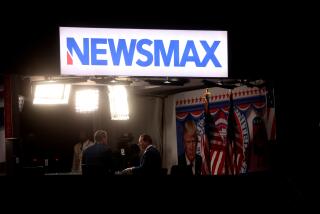Column: Why Fox News’ lies about Trump’s defeat probably aren’t protected by the 1st Amendment

- Share via
Fox News responded to an incendiary court filing in Dominion Voting System’s $1.6-billion defamation suit last week by asserting that “the core of this case remains about freedom of the press and freedom of speech, which are fundamental rights afforded by the Constitution and protected by New York Times v. Sullivan.”
Sullivan, the landmark press freedom ruling, is indeed central to this case. That’s why Fox is facing a potentially disastrous jury trial and the possibility of a gargantuan liability verdict.
The latest filing by Dominion reveals dozens of damning private statements by Fox personalities and executives demonstrating that they knew Team Trump’s claims of a rigged election were hogwash. Yet Fox continued to broadcast the lie that Trump had actually won the election.
Other news organizations have had a field day running deeply embarrassing internal emails, texts and deposition excerpts exposing Fox’s blatantly two-faced behavior. Even as Fox’s stars were broadcasting Trump’s false allegations to their viewers, they were doubting and disparaging them in conversations with one another.
Dominion, the voting equipment manufacturer that found itself at the center of outlandish right-wing conspiracy theories about the election, filed a brief that is chock-full of nuggets for Fox’s detractors. Tucker Carlson wrote to fellow Fox News host Laura Ingraham, for example, that Trump lawyer Sidney Powell was “lying.” Ingraham responded by calling Powell a “complete nut.”
My personal favorite: When a Fox reporter noted correctly on Twitter that there was no evidence of deleted or lost Trump votes, Carlson texted another host, Sean Hannity: “Please get her fired. Seriously….What the f—? … It needs to stop immediately, like tonight. It’s measurably hurting the company. The stock price is down.”
The immediate reason for Carlson’s panic, and the network’s, was that the ultra-right outlet Newsmax was making modest inroads into Fox’s misinformation-steeped viewers, many of whom were already upset that Fox led the networks in accurately calling the crucial state of Arizona for Biden on election night.
So Fox was careful in the aftermath of the election to toe the official Trump line that he had been cheated. In doing so, Fox executives and personalities weren’t just pandering to viewers so as not to lose them to Newsmax and other competitors. They were also treating them with contempt, spoon-feeding them lies that they themselves were too sophisticated to believe.
The 1964 Supreme Court case that Fox invoked, New York Times vs. Sullivan, protects publishers from liability for defamation unless they make false statements with “actual malice,” meaning they either knew them to be false or showed reckless disregard as to their accuracy.
In the judgment of the court, allowing publishers to be punished for good-faith mistakes would cow the press into staying its hand to avoid liability. And that would mean the public would not learn truths that can only be uncovered by a vigorously free and fearless press.
Sullivan, in other words, provides an extra measure of protection even for inaccurate reporting to protect the press’ freedom to hold the government and others to account, which is what the 1st Amendment values.
But mistakes are one thing; knowingly telling lies is another. What Fox’s pious proclamation of press freedom misses is that lies of the sort the network appears to have told its viewers don’t enjoy or deserve constitutional protection. The values enshrined in Sullivan are not what shields Fox but rather what puts it in jeopardy.
The case against Fox is in fact unusually strong. Defamation suits often concern the work of careless or sensationalist reporters slipping past fact-checking safeguards. Dominion’s allegations, by contrast, threaten to lay bare a deliberate corporate decision to ignore the truth and publish lies.
Fox maintains that the incendiary quotes in Dominion’s brief are cherry-picked to paint a misleading portrait. Maybe so. If motions for summary judgment fail, as they almost certainly will, and the parties don’t settle, that’s what a trial, scheduled for April, is likely to sort out.
Fox has to regard that prospect with terror, but it may have no other viable option than to defend itself against what could be one of the highest-stakes defamation trials in U.S. history.
In another piece of bad legal news for Fox, defamation is considered statement by statement. That means that even isolated statements that were known to be false could subject the company to liability.
Since Sullivan, very few American media companies have been found liable for defamation. More frequently, such cases are dismissed before they even delve into the facts. That’s because of the very high burden to show that a defendant knew its reporting was false.
Unfortunately for Fox, however, Dominion appears to have compelling evidence that the network knowingly lied to its audience, sacrificing integrity for ratings and putting profits above truth.
Harry Litman is host of the Talking Feds podcast. @harrylitman
More to Read
A cure for the common opinion
Get thought-provoking perspectives with our weekly newsletter.
You may occasionally receive promotional content from the Los Angeles Times.











